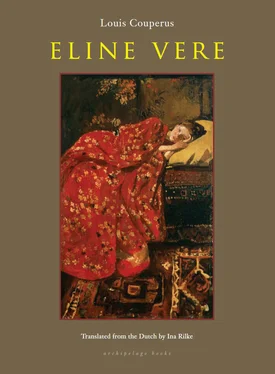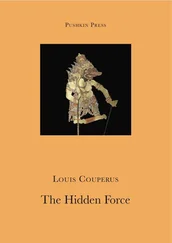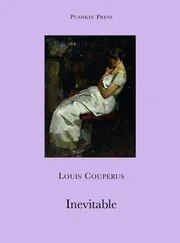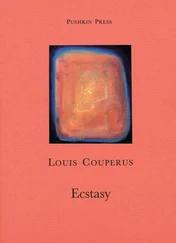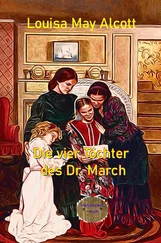While remaining a member of various charities and continuing to give Miss Eekhof money intended for this ailing widow or that blind organ-grinder, she stopped going to church; she also stopped visiting the repugnant poor and resigned from her position on the governing board of the crèches.
Winter arrived, and Eline’s cough kept her indoors. She dragged herself from one uneventful day to the next in monotonous indolence with only Madame van Raat for company, and for the umpteenth time Eline asked herself what purpose there could possibly be to her life if she was not to be happy.
After the disillusionments of philanthropy and religion, she no longer trusted anyone. Looking about her, she could not believe that Georges and Lili were truly in love now that they were married; of course they were disappointed in each other, and only pretending to be happy. She did not believe that Betsy was happy, either, even though she was rich, because how could she love Henk? How could she not long for more passion? Nor did Eline believe that Otto had ever truly loved her; how could he, while his character was so very different from hers? Her feelings of distrust reached such a pitch that she even doubted whether Madame van Raat’s love for her was sincere. Madame had been hoping to find in her an agreeable lady’s companion, that was all, and it was obvious that Eline did not live up to her expectations. Henk’s mother was a hypocrite, like everybody else.
At one time such bitter sentiments would have thrown Eline into black despair, but as it was her soul had become so numbed that she was unaffected by them. She did not care; what difference did it make to her that life was one great lie? It was so, and could not be helped, least of all by her, so she might as well lie like everybody else.
Rather, she would lie as a last resort, when forced by circumstance to show some emotion, some sign of ‘life’. For the rest she would submerge herself in the torpor of detachment.
Such were her thoughts, and she forced her youth to bend under the yoke of apathy and listlessness. Her drift into self-willed indifference even caused her charming manner of old to desert her, and the sympathy she evoked among her associates dwindled as she grew increasingly sullen and unapproachable.
She would stay in bed for the greater part of the morning, and although Madame van Raat disapproved, she permitted Eline’s breakfast to be served in her room, as that was the only way she could be brought to eat anything at all.
Even so, Eline often left it untouched. When she finally rose she did not get dressed at once; instead, she slipped on a peignoir and lounged on her couch or in a chair, staring vacantly out the window. She did not go downstairs until around noon, bowed by the lassitude that seemed to run in her veins like some debilitating, tepid fluid. Reijer called regularly, and insisted that she go out and brave rain, wind or snow, but although secretly she longed for some fresh air, she either remained closeted indoors, or returned home after five minutes. Her only movement would be to hobble from her seat by the window to a chair by the stove, coughing and shivering, with ice-cold fingers, glazed eyes, and her lips tightly pursed.
Madame van Raat lost all hope of her ability to restore some measure of vitality in Eline. It was as she had feared: the task Reijer had assigned to her, and which she so dearly wished to fulfil, was proving beyond her powers. Her hopes faded, and she subsided into the grey mists of her own private melancholy. Hours went by during which the old lady and the young girl sat together in the same room without exchanging a single word, each of them lost in hopeless reverie.
. .
Eline was aware that this desultory cohabitation could not last. There was something about Madame van Raat and about her home, something she could not define, that irritated her. She found herself unable to contain her exasperation at times, and would burst out with some harsh, unkind remark, often for no reason whatsoever. The old lady’s only answer would be a momentary, wounded stare, which would instantly fill Eline with remorse. Sometimes she could not bring herself to apologise, and would scarcely open her mouth for the rest of the day. At other times she was so consumed by guilt that she went down on her knees and hid her face in the old lady’s lap, weeping and begging to be forgiven, lamenting that when she was in one of her black moods. . she knew not where they came from or how to control them. . oh, it was like being possessed by demons, as if she had no will of her own!
Madame van Raat dissolved in tears, too, and kissed her, but the next day the same demons bore down on Eline to crush her will.
Something had to be done, thought Eline. She wrote a long letter to her uncle Daniel and Eliza, in which she bared her soul more than she had ever dared before. She informed them that she felt utterly miserable in The Hague, that she would die of dreariness if she stayed much longer with Madame van Raat, notwithstanding the latter’s great kindness to her, and that she longed desperately for a change of environment. Uncle Daniel came to The Hague and declared to Eline, in the old lady’s presence although without mentioning the letter, that he and his wife missed her and wondered whether she would pay them another visit.
Eline was undecided, but Madame van Raat urged her in mournful tones to accept her uncle’s kind invitation, and it was arranged there and then that she should accompany him to Brussels two days later.
When Daniel Vere was gone, Madame van Raat sat slumped in her chair, her grey head sunk down upon her breast, shattered by the enormity of her disappointment. Another two days and Eline would leave! That would be the end of it! Weak as she was, she had hoped to make herself useful, she had hoped to infuse just a little fresh vigour into the dear young creature’s listless existence, but she could not help seeing that she was defeated: Eline was languishing in her home, Eline yearned for variety! How could she, an old woman, have had such presumption!
Seeing the old lady’s mute sorrow, Eline was overcome with despair, despair over her own egotism. She had not given the slightest thought to Madame van Raat when she wrote that letter to her uncle Daniel; she had thought only of herself, and now she was causing the old lady great distress, even though she herself was convinced that exchanging The Hague for Brussels would not change anything, really, least of all rid her of the fatigue that had plagued her body and soul for the past two years.
‘My dear little Mama!’ she cried tearfully. ‘Are you very sad to see me go? I can hardly think you would have wished to keep me with you, me, ungrateful, cross creature that I am!’
She sank down on a low stool at the old lady’s feet and kissed her hand.
‘Sad? Yes, it makes me sad, Elly!’ faltered Madame van Raat, gently stroking Eline’s forehead. ‘But it will be for the best. Far be it from me to wish you to leave, even if you are not always as sweet-tempered with me as you used to be. Oh, if only I could be confident that you would find happiness here eventually, then I would not tell you to go. But as it is, I say to you: go, my poor child, with my blessing, and come back whenever you wish.’
Eline began to sob.
‘It’s all my fault, I know it is! You are such a dear, you have been so very kind to me, and I have yet to hear you utter a single word against me. You spoil me as if I were your own flesh and blood, and in return I fly into rages and say abominable things! Oh, what a wretched creature I am! How I wish I could be different! Time was when I would have loved nothing more than to be spoilt by you, but now. . now it makes no difference! It’s not that I don’t love you, because I do, I love you more than anyone else in the world, but, you see, nothing matters to me any more, nothing, nothing!’
Читать дальше
